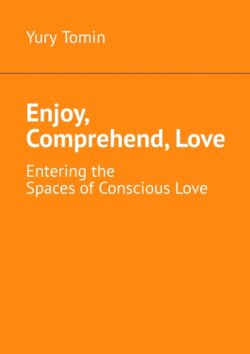Читать книгу Enjoy, Comprehend, Love. Entering the Spaces of Conscious Love - Yury Tomin - Страница 18
PSYCHOLOGY OF LOVE
Platonic Love
ОглавлениеSince we do not consider it appropriate to take our own notes in the margins of Plato’s works, to describe his views on love, we will resort to the opinion of famous thinkers.
Ortega y Gasset notes with admiration that Plato defines “the disease-causing nerve” of love: “Love is the eternal passion to generate oneself in beauty.” And he explains the essence of Plato’s idea: “Love certainly includes the desire of the lover to unite with another person whom he considers endowed with some kind of perfection. In other words, it is the attraction of our souls to something in a certain sense wonderful, excellent and higher.” It is no wonder that the inexplicable need to dissolve his personality in the personality of another person and, conversely, to absorb the personality of a loved one into his personality is symbolically reflected in the child: “A child is neither a father nor a mother, but their personified unity and boundless striving for perfection, which has become a physical and spiritual reality.”
The attraction of the soul in love to the superior and higher is one of the sides of the already known process of going beyond the limits of one’s Self. And children are undoubtedly part of this multifaceted process. Moreover, here again, we are faced with a double and contradictory play of nature. On the one hand, the beauty of the object of love is guessed (recollected) as genuine beauty, “a wonderful vision of the divine mystery.” On the “other hand, humans can approach it only in a harness of the soul of two different-colored winged horses. Let’s talk about this together with the Russian philosopher Alexei Losev.
According to Losev, Plato created an ingenious synthesis of two concepts: the cosmic Eros, which organizes the universe, creating people and gods, and the Eros of the lyrical individual attraction. The secret of love, which Plato discovered, is that this state “at least for a while gives communication with someone else’s soul and through that reunification with the lost total unity.”
When, in the struggle of a rational horse with a horse thirsty for pleasure, victory remains with the noblest kinds of soul, which dispose a person to good behavior and philosophy, lovers “blissfully spend life here in like-mindedness,” and after death, they become winged and light, and their perfect soul rises to true being. But if the evil horses win, then there is neither love nor philosophy, but what the rabble calls bliss.
“But wait, what about the boy?” – the caustic reader will ask. Well, first of all, not a boy, but rather a young man. Secondly, let us introduce after Losev the mental correction we need to understand love in the broad historical perspective of mankind: “There is no woman yet. ‘Beholding the beauty of the boy <…> the soul is carried away and receives warmth, feels relief from grief and rejoices.’ What Plato said about Eros in Phaedrus is such a fullness of feeling and aspiration of human nature that we can directly cross out this annoying boy and say with force: a woman.”
In the Symposium Plato reveals in the image of the god of love Eros his manifestations in people. What divine possibilities does love bestow on people and what are the requirements of Eros, which must meet high love? First, love endows people with valor and grants them bliss during life and after death (the return of souls from Hades). Secondly, of the two Eros, one must follow the Eros of heavenly Aphrodite, love the soul more than the body, love for high moral dignity, and both lovers take care of their moral perfection. Thirdly, Eros is spread throughout nature, and in order to achieve harmony in any business, you need to follow reasonable Eros. Fourth, in love, the integrity of a human being is achieved, possessing strength and power comparable to the gods. Fifth, Eros, and therefore a person in love, is always young, handsome, gentle, reasonable, fair, brave, wise, a master in arts and crafts. But these five sides of Eros, revealed in the speeches of the participants of the Symposium
